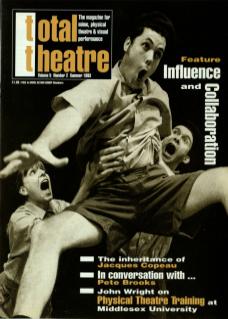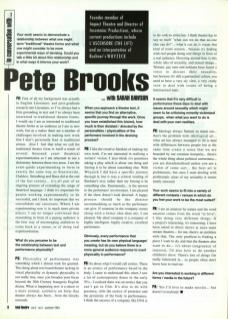Your work seems to demonstrate a relationship between what one might term ‘traditional’ theatre forms and what one might consider to be more experimental ways of devising. Could you talk a little bit about this relationship and in what ways it informs your work?
PB: First of all my background was actually in English Literature, and post-graduate research into Literature, so I've always had a firm grounding in text and I've always been interested in traditional theatre forms. I would say I am as interested in traditional theatre forms as an audience member as I am in new work, but as a maker there are a number of challenges involved in making new work that I don't personally find in traditional arenas. Also I feel that what we call the traditional theatre form is itself a result of several thousand years’ theatrical experimentation so I am reluctant to see a dichotomy between these two areas. I see the avant-garde experimenting in form in exactly the same way as Stanislavski, Chekhov, Strindberg and Ibsen did at the end of the last century... it's all part of an ongoing process of extending the range of theatrical language. I think it's important for people working experimentally to be successful, and I think it's important that we consolidate our successes. Where I am experimenting now is in much more private places. I am no longer convinced that researching in front of a paying audience is the best way of encouraging audiences to come back to a venue, or of doing real experimentation.
What do you perceive to be the relationship between text and performance physicality?
PB: Physicality of performance was something which I almost took for granted. This thing about text-based theatre lacking in visual physicality or dynamic physicality is not really true, once you broaden your focus beyond the 20th Century bourgeois English drama. What is happening now is a return to a more normal, synthetic artform that theatre always has been... from the Greeks onwards.
When you approach a theatre text, it seems that you find an alternative, specific journey through the work. Once you have established this (vision), how much is then dictated / directed by the personalities / physicalities of the performers involved in the devising process?
PB: I like the creative freedom of making my own work. I'm not interested in realising a writer’s vision. I also think it's pointless taking a play which is about one thing and forcing it to be about something else. With Woyzeck I did have a specific journey through it, but it was a critical reading of Buchner's text, rather than me forcing it to be something else. I am pleased if the show doesn't look directed. A happy process should be the director accommodating as much as the performers can give. If someone in the company comes along with a better idea than me, I am pleased. My ideal company is a company of highly intelligent, highly creative, excellent performers.
Obviously, every performance that you create has its own physical language/meaning, but do you believe there is a more general audience response to overt physicality in performance?
PB: It’s about what I would call erotics. There is an erotics of performance based in the body. I came to understand this when I saw a lot of contemporary dance in the early 70s... I realised there was an erotics that you can't get in film. It's also to do with presence, with the erotics of presence and the proximity of the body in performance. I think the success of a company like DV8 is to do with its eroticism. I think theatre has to say to itself ‘what can we do that no-one else can do?’... What it can do is create that kind of erotic tension... because it's dealing with real people doing real things in front of a real audience. Hovering around that is this whole idea of sexuality, and sexual charge... Women, gay men and lesbians have found a voice to discuss their sexuality, but because it's still a patriarchal culture you need to have a very sly view, a very crafty view to deal with issues of being a heterosexual man.
It seems that it's very difficult in performance these days to deal with issues around sexuality which might seem to be criticising minority victimised groups, when what you want to do is deal with your own realities.
PB: Ideology always flattens so much out... that's the problem with ideological art... what art has always managed to do is deal with differences between people but at the same time create a sense that we are bounded by our common humanity... there's the whole thing about political correctness... you are disenfranchised unless you are a victim of some sort... the best art is problematic, but once I start dealing with problematic areas of my sexuality it seems totally unsound.
Your work seems to fit into a variety of different contexts/venues – in which do you feel your work to be the most suited?
PB: I am an amateur by nature and the word amateur comes from the word ‘to love’. I like doing very different things. If a project's interesting, it's interesting. I have been asked to direct shows at more mainstream theatres... for me, there's no problem with that. The only problem is finding a piece I want to do, and that the theatres also want to do... it's about congruence of interests. I'd also love to do another children's show. There's lots of things I'm really interested in... so people often don't know how to read me.
Are you interested in working in different forms / media in the future?
PB: Yes I'd love to make movies... but doesn't everybody!

